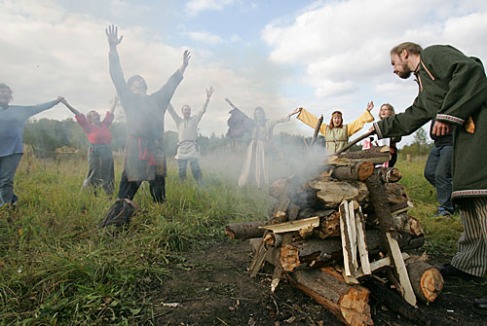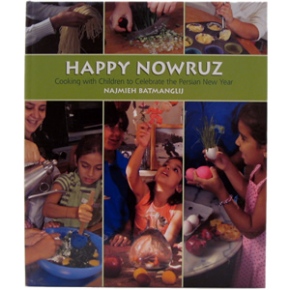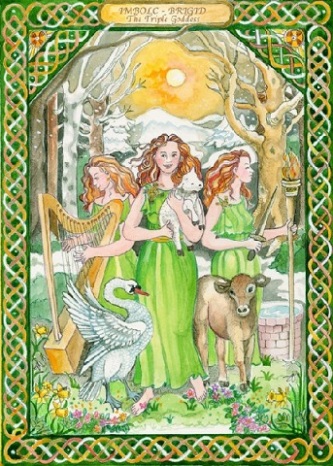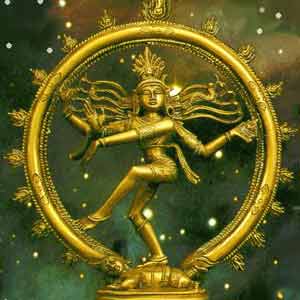When an article is rather lengthy, there is a tendency for people to skim and pick out bits and pieces out of context, and respond to what they think they just read, while missing the other points.
The previous post was in no way meant to insinuate that there are not many Spring festivals all around the world. There are! Many of them use some of the same imagery, eggs, rabbits, etc. It was not to imply that Germanic culture corners the market on that.
The point was to address the meme going around the internet that states incorrectly that the word Easter derives from Ishtar. So perhaps it’s my own error in not being more clear. (Incidentally, I am far from the only person taking issue with this meme, by all means read Megan McArdle’s article and the Belle Jar Blog).
The fact of the matter is, the word Easter derives from the Anglo-Saxon goddess Eostre. In Germany you will find Ostern, deriving from Ostara. Both were Spring Equinox festivals.
In old Celtic society you will find the Spring equinox festival Alban Eilir, celebrated by contemporary practitioners of Celtic Druidry and paganism today. According to the Order of Bards and Druids, eggs are also a traditional symbol of this holiday.
I recently responded to questions and comments on our Facebook page about why I’ve been mentioning Brigid in conjunction with Ostara, and had to clarify that while they are not connected linguistically, and while their holidays fell at different times of the year, Brigid’s holiday Imbolc (usually celebrated between Jan 30th to February 2nd) is also a heralding of Spring. Milk and dairy held significant meaning to the Celts who celebrated Imbolc, and symbolically they had a similar meaning as eggs do on Easter. The milk and eggs functioned in the same way, to stand for new life, rebirth, renewal, as well as nurturing sustenance.
CLEARLY this happened all over the world! Duh! The point is not that Germanic culture as the one and only culture with a claim on Spring! My point is just that all cultures deserve respect. Ishtar deserves respect within her cultural context.
People all around the world are attempting to reconnect with old ways that were often suppressed and hidden to history. It’s not just Germanic and Celtic descendants. There are Hellenic pagan groups in Greece, Italian-American Stregheria practitioners, revivers of the Old Religion in Italy, Slavic Rodnovery, Lithuanian Romuva, and even people attempting to revive Canaanite paganism and Egyptian Kemetic pagan religion. 
So for non-pagans to whom all of this “pagan jargen” is foreign, as well as to Wiccans and eclectics who haven’t been exposed to this other heritage influenced paganism, here’s a newsflash: it is NOT just the Germanic heritage that makes a connection between pagan religion and cultural heritage. It is happening all over the world with many cultural groups.
At Northern Grove, we support ALL of these people! And while we do support and would love to network with them, obviously every group has to have a focus, and ours is on the Northern European traditions. So our page attempts to explore and learn more about the Germanic, Celtic, Baltic, Slavic, Saami, Finn, and other groups in the region.
Anyway, the whole point about Ishtar and Easter was simply that Easter is an English word deriving from an Old English goddess. Ishtar is a Babylonian goddess, who likely had her own festival. I did Google it and couldn’t locate one, though. So by all means if someone knows it, link me to some info 🙂
I don’t put anybody’s culture above anybody else’s. But I hope as the Pagan movement grows, we can be respectful of ALL the cultures we’re representing.
Sure cultures overlap and have connections. People attempting to “school” me on this point have obviously not spent time on my Facebook Page, where I continuously butt heads with white supremacists (who turn up hoping we support that and get very angry when they discover we dont!) and I constantly point out that nobody’s ancestors lived in a vacuum. (Except perhaps those in harsh climates and remote islands, lol)
I have to roll my eyes at some of these comments, which yes, I am deleting. I stand up for respect of other cultures pretty much EVERY DAY. I continuously share articles with commentary about the way our ancestors interacted with other cultures, and explain that racial or cultural purity arguments are bogus.
But, there comes a point when the double standard has to be called out. Here I constantly say those things, but when I say “wait a minute, you’re taking an Old English word and attributing it to a Babylonian goddess, please respect my culture!” People try to turn it into some kind of racial purity thing. Ridiculous!
I’m also incredibly interested in Baltic paganism and Lithuanian Romuva and have discussed the connections and similarities between it and Hinduism. But look, there is an Indo-European background there. Not some long lost ancient connection from so many thousands of years ago that it barely makes sense to force a comparison.
I’m done with this rant, and hopefully now we can move on to more interesting topics!
~ Aelfwynne ~


